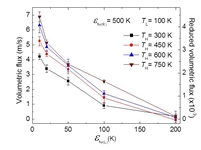Chip-level cooling using composite nanochannels






Objective
Electronic device cooling, especially nanoscale device cooling is a challenging issue. In this project, we aim at developing nanochannel fluidic systems to enhance electronic device cooling without using a mechanical pump. The intrinsic temperature gradients in devices are used to drive fluids.
Approach
Molecular dynamics simulations are used to explore how the wall surface energy, temperature gradient, and channel size will affect the flow. Experiments will be conducted to investigate the flowrate and cooling capacity at various conditions.
Impact
The thermal management of electronic devices has been a bottleneck, especially for micro- and nano-devices, which requires an efficient and compact cooling system. A great advantage of composite nanochannels is that they do not require external pumps, which consume power and occupy space. Therefore, the technique developed in this project is a promising method for the cooling of the next-generation electronic device and various chips.
Contact
Zhigang Li, Professor of Mechanical and Aerospace Engineering
Email: mezli@ust.hk